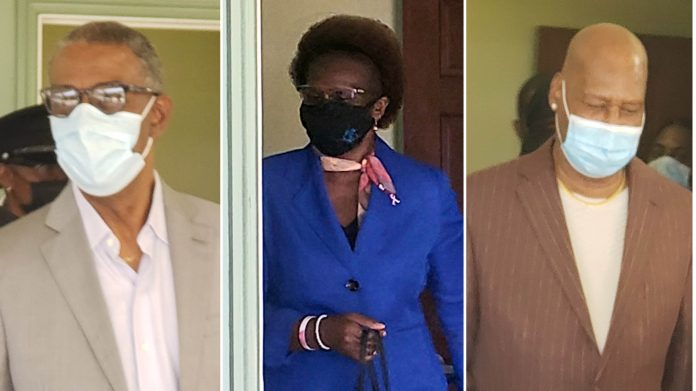By Elesha George
Next Tuesday, Justice Colin Williams will determine whether to continue a criminal case against three former government ministers accused of embezzlement, conversion and corruption, regarding their acquisition of three 2008 Daewoo buses.
The UPP’s Dr Jacqui Quinn, Harold Lovell and Wilmoth Daniel have been accused of converting and using the vehicles – worth more than $200,000 each – for their personal use.
The state alleges that the buses were a donation from the government of South Korea to the former United Progressive Party (UPP) administration in 2008.
On Wednesday, the defence made an application to the judge to withdraw the case on the basis that there is ‘no case to answer’, after cross examining more than 10 witnesses and exploring dozens of documents submitted as evidence by the prosecution.
By the end of the week, ‘no case’ submission arguments were heard from both the defence and the prosecution.
Early on in the argument, Director of Public Prosecutions (DPP), Oris Sullivan, attempted to convince the court to reject all the applications put forward to have the case thrown out.
On Friday, he petitioned the court to have the charge of embezzlement changed to larceny which he claims is an alternative, using the principle that “the greater includes the lesser”.
The argument rationalises that both larceny and embezzlement fall under the same category, however larceny is a lesser charge.
Defence Counsel Anesta Weekes QC told the judge that the charge in its entirety should be quashed, arguing that larceny is a completely different charge that the Crown would now have to prove. In addition, she claimed that amending the charge of embezzlement at this stage would be an injustice to her client –Lovell.
Justin Simon QC agreed, adding that the prosecution would have to satisfy the very definition of larceny as laid out in law. He noted that no document or evidence was presented to the court to indicate that the buses had previously belonged to any other party than the accused, and therefore could not have been stolen.
Attorney for Dr Quinn, Dane Hamilton QC, also submitted that these changes could not be made without causing injustice to his client, telling the court that the DPP failed to show that Dr Quinn acted corruptly or fraudulently when she acquired the bus while carrying out her duties as a minister.
Meanwhile, Simon argued that the current charge of embezzlement, as outlined in the laws of Antigua and Barbuda, does not apply to government ministers.
The accused were charged under Section 20 of the Larceny Act which speaks specifically to larceny and embezzlement by clerks or public servants, including those employed in the service of Her Majesty or a member of, or employed in the police force.
Because the charge put forward by the prosecution specifically refers to his client – Wilmoth Daniel – along with the two other accused ministers, Simon went at lengths to distinguish the definition of someone employed in the public service and who can be brought before a court on that charge versus a person holding an office within the public service.
The former – someone employed in the public service – is appointed and can be dismissed by the Public Service Commission, whereas and according to Section 69 (3) of the Constitution, a minister can either be appointed by parliament, an act of parliament, or by the Governor General on the advice of the Prime Minister.
“That element is missing when one considers the evidence provided by the prosecution,” Simon noted.
As it relates to the charge of conversion, the DPP argued that the accused had no lawful title of the buses which he maintained belonged to the government of Antigua and Barbuda.
But Simon said the prosecution had failed to establish from whom the accused received the buses since conversion refers to property being entrusted to one person from another, and then being used for a purpose outside of what was agreed and for their own use.
He reasoned further that while the grant aid was given to Antigua and Barbuda by the government of South Korea, it was a donation from state to state, facilitated by the government because that’s the practice of diplomatic relations between countries. The QC’s stance was that the buses were donated to the country and not necessarily the government and he felt there was no evidence to show otherwise.
Having heard arguments from both sides, the defendants and their lawyers will know on Tuesday whether they in fact have no case to answer, or whether the case will continue and they will be called to testify in their own defence.

